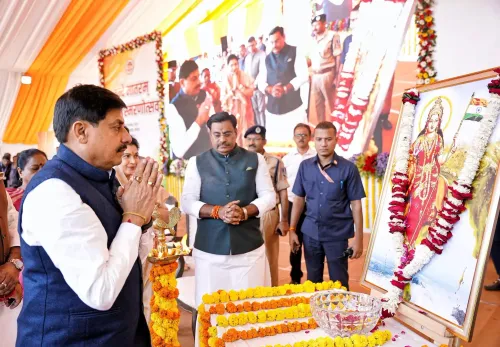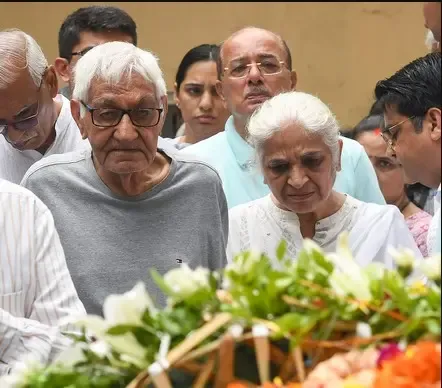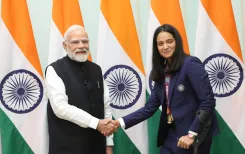How Did 'Vande Mataram' Emerge as the Voice of India's Awakening During Slavery?

Synopsis
Key Takeaways
- Vande Mataram symbolizes India's struggle for freedom.
- It was first published in 1875 by Bankim Chandra Chatterjee.
- The song has achieved an immortal status in Indian culture.
- The year 2025 marks the 150th anniversary of the song.
- Nationwide celebrations aim to reconnect youth with its legacy.
New Delhi, Nov 7 (NationPress) Prime Minister Narendra Modi inaugurated the year-long celebration of the 150th anniversary of the National Song at the Indira Gandhi Indoor Stadium, emphasizing that during the era of slavery, 'Vande Mataram' emerged as the voice of India’s renaissance.
While addressing the attendees, Prime Minister Modi stated, “From the timeless journey of humanity, we have drawn insights and developed new conclusions over time. These insights helped us evolve and enhance the values and ideals of our civilization. Our forebears, sages, seers, and divine figures bestowed upon us a unique cultural identity.”
He further noted, “In the dark days of slavery, Vande Mataram became the anthem of India’s awakening — a proclamation that the shackles binding Maa Bharati would shatter through her own children, who would then forge their destinies. Vande Mataram has remained relevant throughout and achieved a form of immortality. The opening line, ‘Sujalam suphalam, malayaja shitalam, shasyashyamalam, Mataram!’ signifies our reverence for our land, rich in natural beauty and abundance. This is India's identity, which has thrived for a millennium.”
“In 1875, Bankim Chandra Chatterjee introduced Vande Mataram in 'Bangadarshan'; some dismissed it as just a song. However, it gradually resonated as the collective voice of India’s awakening, embodying the united cry of millions that captured the essence of revolution and the sentiments of every Indian,” PM Modi remarked.
He elaborated, “Even in the face of adversity — pain, devastation, and hopelessness — Bankim Babu envisioned a flourishing India. He firmly believed that regardless of the challenges, India could reclaim its glorious past. That’s why he called upon Vande Mataram.”
The Prime Minister also acknowledged the pivotal role of Vande Mataram in the struggle for freedom.
“Freedom fighters like Veer Savarkar, who dedicated their lives to India’s independence, would greet one another with Vande Mataram. Numerous revolutionaries uttered Vande Mataram even from the gallows,” he stated.
As per a release from the Prime Minister’s Office (PMO), the year 2025 marks the 150th anniversary of Vande Mataram. This national song, penned by Bankim Chandra Chatterjee during the auspicious occasion of Akshaya Navami on November 7, 1875, was first featured in the literary journal 'Bangadarshan' as part of his novel 'Anandamath'. The song invokes the Motherland as a symbol of strength, prosperity, and divinity, eloquently expressing India’s spirit of unity and self-respect. Over time, it has become an everlasting emblem of devotion to the nation.
On October 1, the Union Cabinet sanctioned nationwide celebrations for the 150th anniversary of Vande Mataram to foster a broad movement that connects citizens — particularly youth and students — with the song’s original revolutionary essence. The celebrations aim to honor this timeless message and ensure its legacy is ingrained in the hearts of future generations.
The BJP has also outlined an extensive agenda for nationwide festivities commemorating two significant cultural milestones — the 150th anniversary of Vande Mataram and the 150th birth anniversary of tribal icon Bhagwan Birsa Munda.








